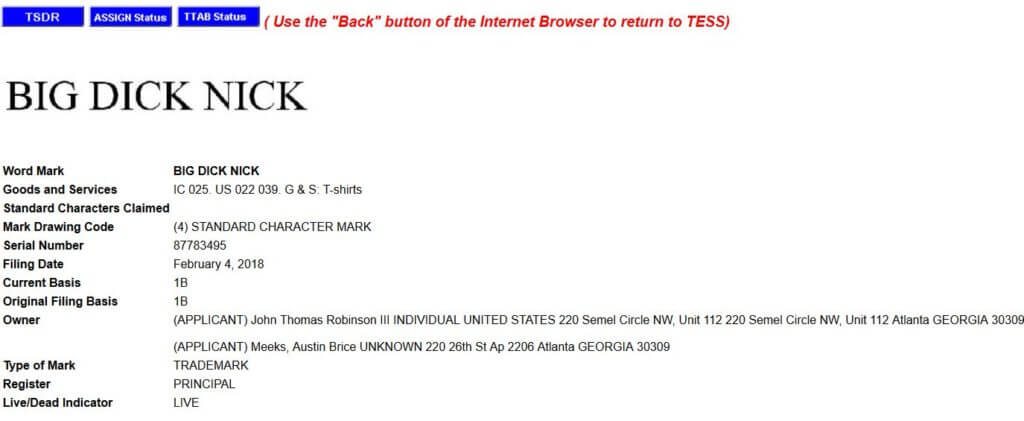BIG DICK NICK Trademark Application Filed for T-Shirts
Before the Philadelphia Eagles pulled off their underdog victory and quarterback Nick Foles became a Super Bowl MVP, two individuals in Atlanta decided to put their money on Nick Foles by filing a BIG DICK NICK trademark application. The BIG DICK NICK TM application is here.
On Feb 4, 2018 (2 days before the Super Bowl), two individuals filed an intent to use trademark application for T-Shirts in connection with the phrase “BIG DICK NICK”. For those who are unaware, the “Big Dick Nick” chant became a battle cry for many Eagles Fans throughout the Eagles playoff run.
Disparaging, Immoral, or Scandalous Trademarks Were Once Prohibited
If Nick Foles and the Eagles won the Superbowl® last year (in 2017), a BIG DICK NICK trademark would have been rejected as “immoral” or “scandalous”. Thanks to the United States Constitution, signed in Philly, that’s no longer the case. In December 2017, a Federal Court of Appeals declared that the Trademark Office can’t reject applications on immoral or scandalous grounds. Regulation of trademarks on such grounds violates free speech rights embodied in the First Amendment of the Constitution.
Historically, any trademark application that disparaged a person, or contained scandalous or immoral material was rejected. Section 2(a) of the Trademark Act, prohibited the registration of disparaging, immoral, or scandalous marks. 15 USC § 1052(a)
Then came THE SLANTS, with their Asian-disparaging band name, who appealed their trademark rejection to the Supreme Court on free speech grounds. The Supreme Court agreed with THE SLANTS, finding the “disparaging” part of Section 2(a) to be unconstitutional. Matal v. Tam, 137 S. Ct. 1744, 1765, 198 L. Ed. 2d 366 (2017)(“[W]we hold that the disparagement clause violates the Free Speech Clause of the First Amendment.”)
Meanwhile, Erik Brunetti, was in the process of appealing his “immoral” trademark rejection for FUCT. The Federal Circuit Court of Appeals, in view of THE SLANTS case, found that regulating “scandalous” or “immoral” trademarks is also unconstitutional. The entirety of Section 2(a) is then declared unconstitutional on First Amendment Grounds. In re Brunetti, 877 F.3d 1330, 1341 (Fed. Cir. 2017)(“ Section 2(a)’s Bar on Registering Immoral or Scandalous Marks is an Unconstitutional Content–Based Restriction on Speech“
The Real Hurdle for BIG DICK NICK Is Earlier-Filed (Blocking) Applications or Registrations for BIG DICK
There are a lot of big dicks at the Trademark Office, and I’m not referring to the staff of Examining Attorneys. Many applicants have registered or applied for a BIG DICK trademark over the years. This could be a problem for the recent filing for BIG DICK NICK. One of these earlier-filed trademarks could block the BIG DICK NICK application.
A quick search for BIG DICK at the TM office came up with 49 hits for prior filed applications. Ten of these applications were in the apparel category. Two of them are “live”, and therefore may block registration of the BIG DICK NICK application.
Under Section 2(d) of the Trademark Act, an application cannot register when there is a likelihood of confusion with the earlier-filed trademark. The Examining Attorneys at the TM office analyze (1) similarities between the names and (2) similarities in the associated goods. Considering BIG DICK NICK vs. earlier-filed BIG DICKS, the goods are the same: T-shirts.
So, the analysis boils down to the differences between the names. . . .
In examining the differences between the names, all of the earlier-filed trademarks contain BIG DICK. The only distinguishing aspect is NICK. The Trademark Examiner likely will reject BIG DICK NICK finding that the common element between the marks – BIG DICK – is the dominant portion, and adding NICK is not sufficient to avoid confusion between the marks. This rejection is Complete-Nonsense!
When analyzing trademarks for confusion, differences in meaning and commercial context must not be ignored. This is where BIG DICK NICK prevails. When you hear or see the words BIG DICK NICK, you know exactly what the deal is. The phrase BIG DICK NICK will forever be embedded in the sports world’s conscience as referring to the Superbowl LII Philadelphia Eagles, and Quarterback Nick Foles in particular. For millions of people, the phrase immediately evokes Nick Foles and the Philadelphia Eagles. The public record is replete with evidence of this connotation / association. In contrast, when one hears the words BIG DICK alone, a completely different connotation is reached.
A case I had 15 years ago for a Conshohocken business is a great example of connotation-based differences. Shen Mfg. Co., Inc. v. Ritz Hotel, Ltd., 393 F.3d 1238, 73 U.S.P.Q.2d 1350 (Fed. Cir. 2004), cert. denied, 2005 WL 2413994 (U.S. 2005) (PUTTING ON THE RITZ “conjures images of fancy, even swanky, ladies in full length gowns and gentlemen in tails and top hats congregating in a large Art Nouveau restaurant where an orchestra is about to start” compared to the RITZ mark for kitchen textiles, which evokes images of “cleaning, cooking or manual labor generally.”).
Applied to the present facts, BIG DICK impresses on the mind connotations of large (well endowed) penis, or a nickname for a big guy name whose first name is Richard. Add the word NICK to the phrase, and the connotation takes on the now well-known understanding of QB Nick Foles. BIG DICK alone simply does not conjure up the same mental mojo. For these reasons, a Section 2(d) earlier-filed blocking rejection does not hold water.
The Trademark Act Prohibits Registering Famous Nicknames Without Consent
Section 2(c) of the Trademark Act prohibits registering nicknames without the consent of the individual. For super-famous people, like Barack Obama and Kate Middleton, any use of the name as a trademark triggers a Section 2(c) rejection.
For the less famous – for example, people who are famous in a given industry, or among a particular group of consumers – it is harder to reject the trademark. The Examining attorney must show a connection between the person and goods sold under the trademark.
Examples of Famous Identity Rejections:
Person: Trademark:
Barack Obama OBAMA’S PAJAMAS
Kate Middleton PRINCESS KATE / ROYAL KATE
Is Nick Foles Famous Enough to Trigger a Section 2(c) Identity Rejection for BIG DICK NICK?
There is room for argument. A Google search for “BIG DICK NICK Foles” results in 42,000 hits. Searching for “Nick Foles” results in 519,000 hits. This pales in comparison to the 18,500,000 hits you get when searching Kate Middleton – or the 123,000,000 hits for Barack Obama.
The Trademark Office has a low threshold to reject the application. The Examining Attorney must make a prima face showing that the public would understand BIG DICK NICK as referring to Mr. Foles. I think the Examining Attorney has enough evidence to make that showing. Rebuttal is up to the applicant. Here, the applicant should argue (1) Mr. Foles isn’t among the super-famous like Obama and Kate Middleton, and (2) Mr. Foles is not in the business of producing apparel. Therefore, reasonable consumers are not likely to think Mr. Foles is the producer of the apparel.
A Formal Trademark Opposition Can Sack the the BIG DICK NICK Application
If the trademark application passes examination, Mr. Foles can file a trademark opposition to the BIG DICK NICK application on these grounds and others. Practically anyone who believes they would be damaged by registration of the mark could file an opposition. 15 U.S.C. § 1063(a)
On that note, good luck to the applicant with your Big Dick Nick Trademark Application!

